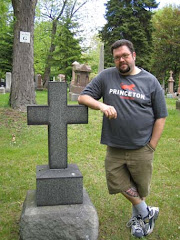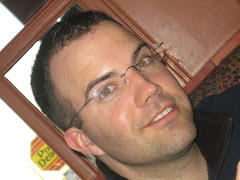1 Chronicles 1: 1-27
OK, to use some stereotypical United Church talk, I realize that I’m coming into the Sabbath blog “from a place of privilege”. I’m not currently in an active youth ministry position, either paid or volunteer. I have no responsibilities for worship, youth group, or committees. My present congregational church involvement consists entirely of sitting in a pew, singing hymns quite poorly, and trying not to drop my bulletin on the floor during the prayers of the people. It’s awesome!
Maybe it’s the Spirit at work, or maybe it’s just dumb luck, but this time of group Sabbath has fallen during my own time of personal sabbatical. By stepping out of churchy stuff for a while, I’m hoping to discover what I get homesick for, and to see what God might want (or desperately not want in a million years…) for me. Just don’t call it “discernment”, because in our little UC world, that usually means more structure and meetings. Maybe that’ll come later, but for now, I prefer the Greek term “SLACKOS”. Loosely translated, it means “sacred-time-to-watch-TV-and-eat-nachos”.
There’s a strange paradox at work when the people who face the most difficulty in creating time for intentional Sabbath are the ones we’ve asked to provide our spiritual leadership. But, there it is. At the risk of sounding patronizing and rubbing it in, I empathise with people for whom Sabbath time feels like just another commitment in an already overloaded schedule. I don’t know how I would have done it before Slackos time.
Ministry routines for many of us are pretty basic. Make a list of everything to be done, write it in a calendar, and then try like heck to stay one day ahead. At the very least, give the appearance that you’re one day ahead. Sure, there are always surprises that will spring up along the way, but for the most part, it’s the regular week-in and week-out things that fill our days.
Finish a youth retreat, and immediately start working on the next evening worship service. Make a presentation for the board, and then book a coffee date with some kids. Go to a basketball game at the school, and then prepare for camp staff interviews. It’s about reaction - living in the moment and always anticipating what comes next. React, react, react.
It’s exhilarating and energizing. There are so many great kids to be in ministry with, so many faith experiences to share, so many amazing things to do. It’s all about the present, and the future is boundless.
The problem was that I’d created a constant state of reaction for myself, and I couldn’t keep up. I hit a point where I couldn’t see the future, I was out of ideas, and I didn’t know why. It was hard to admit, but I wasn’t happy with the quality of ministry I was offering, and I knew that the kids and the church deserved better.
And so, along comes Arphaxad, the great hero of 1st Chronicles 1. Based on the details of the scriptures, this is what we can learn about mighty Arphaxad in verse 17:
Nothing. Absolutely nothing.
He was begat-ten by some guy named Shem, and then later, he begat somebody else named Shelah. That’s it. But, somehow it’s enough to get his name in the Bible. Not bad, eh?
It may seem odd to read Chronicles as part of a Sabbath ritual. Perhaps the ancestral genealogy lines of ancient Hebrew societies are not the most spiritual content out there.
But, it’s the only place you’ll hear about Arphaxad. Besides, you also get to read about Nimrod and Gomer in the same passage. Funny names are always a good time.
Chronicles forces us to step off the reaction cycle for a while – to view ministry and community as more than just what comes next. It provides a past to support the future that we all dream of. People like Arphaxad laid the groundwork of faith that we’re still building on now, but unfortunately it’s rare that we take the time to realize that they even existed.
Long before we came up with that innovative new event (or activity, or song, or study, or story, or prayer, or worship, or…) our support network was already in place. For thousands of years, God worked in Arphaxad and Shem and Gomer and countless others, just the same way that God is works through us now.
Generations from now, God will still be working, and we’ll be the forgotten, essential, foundation-building ancestors. There's a lesson in there for youth ministry. Unless there’s a major Biblical revision in the meantime, we won’t have our names in the Bible, but that’s probably not why we’re in this, is it?
Sabbath for me has been an opportunity to remember where I came from, to re-discover that foundation of faith that holds us up even when we’re too vain or stubborn to acknowledge it. There are so many relationships for which to be grateful - so many mentors, friends, and family to appreciate. And alongside the gratitude that needs to be expressed, there is also much forgiveness to be sought.
For me, I couldn’t do that until I stopped reacting. I needed to stop. I needed to look behind for a little while before I could look ahead again.
There’s a lot yet to be done in God’s world. We’ve been given a heavy responsibility, and it can be intimidating. We’re not going to finish the trip all at once. But, as we continue on through Lent, following the same liturgical year that Christians have observed for a thousand years, it’s reassuring to remember that we’re going in the right direction.
There are a bunch of people with funny names who’ve already cleared a path.
Subscribe to:
Post Comments (Atom)











4 comments:
Great reflection. Thanks.
Kent... are you missing sermon writing?
That was really inspired, my friend, thanks for that!
You write very well.
I have to wonder how you missed the other references to Arphaxad in scripture (Genesis and Luke.) Perhaps a closer study of the character and some of the questions surounding him might do you well.
Post a Comment